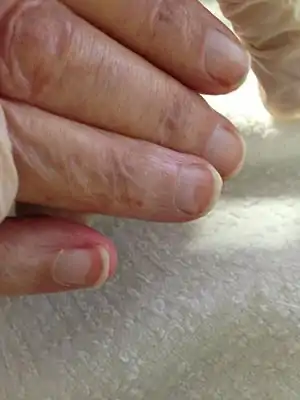Terry's nails
Terry's nails is a physical condition in which a person's fingernails or toenails[1]:659 appear white with a characteristic "ground glass" appearance without any lunula.[2] The condition is thought to be due to a decrease in vascularity and an increase in connective tissue within the nail bed.[3] It frequently occurs in the setting of liver failure, cirrhosis, diabetes mellitus, congestive heart failure, hyperthyroidism, or malnutrition. Eighty percent of patients with severe liver disease have Terry's nails, but they are also found in people with kidney failure, in patients with congestive heart failure[4] and are described as a brown arc near the ends of the nails.[5] The recognition of characteristic nail patterns, such as Terry's nails, may be a helpful herald for early diagnosis of systemic diseases.[4] This finding was named for Richard Terry.[6]
| Terry's nails | |
|---|---|
 | |
| Terry's nails | |
| Specialty | Internal medicine, Dermatology |
| Diagnostic method | Physical examination |
| Differential diagnosis | Liver failure, cirrhosis, diabetes mellitus, congestive heart failure, hyperthyroidism, or malnutrition |
| Treatment | Directed at underlying condition |
See also
- List of cutaneous conditions
References
- Freedberg, et al. (2003). Fitzpatrick's Dermatology in General Medicine. (6th ed.). McGraw-Hill. ISBN 0-07-138076-0.
- Stulberg, Daniel L.; Linford, Sean; Fawcett, Robert S. (2004-03-15). "Nail Abnormalities: Clues to Systemic Disease - March 15, 2004". American Family Physician. 69 (6): 1417–1424.
- Rapini, Ronald P.; Bolognia, Jean L.; Jorizzo, Joseph L. (2007). Dermatology: 2-Volume Set. St. Louis: Mosby. p. 1029. ISBN 978-1-4160-2999-1.
- Nia, AM; Ederer, S; Dahlem, KM; Gassanov, N; Er, F (July 2011). "Terry's nails: a window to systemic diseases". The American Journal of Medicine. 124 (7): 602–4. doi:10.1016/j.amjmed.2010.11.033. PMID 21683827.
- Examination Medicine. Nicolas J Tally. MacLennan and Petty Pty Ltd. 2003
- Terry, Richard (10 April 1954). "White nails in hepatic cirrhosis". Lancet. 266 (6815): 757–9. doi:10.1016/s0140-6736(54)92717-8. PMID 13153107.